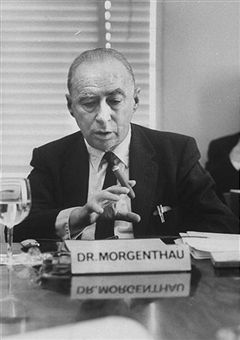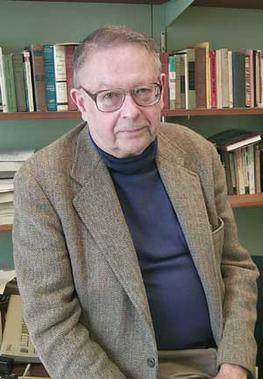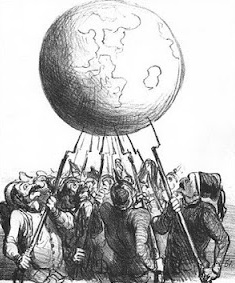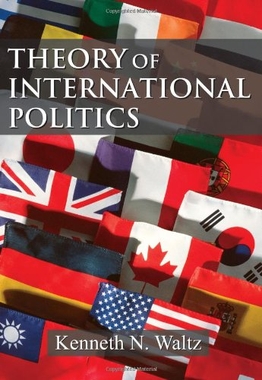Related Research Articles
Neorealism or structural realism is a theory of international relations that emphasizes the role of power politics in international relations, sees competition and conflict as enduring features and sees limited potential for cooperation. The anarchic state of the international system means that states cannot be certain of other states' intentions and their security, thus prompting them to engage in power politics.

International relations (IR) are the interactions among sovereign states. The scientific study of those interactions is also referred to as international studies, international politics, or international affairs. In a broader sense, the study of IR, in addition to multilateral relations, concerns all activities among states—such as war, diplomacy, trade, and foreign policy—as well as relations with and among other international actors, such as intergovernmental organizations (IGOs), international nongovernmental organizations (INGOs), international legal bodies, and multinational corporations (MNCs). There are several schools of thought within IR, of which the most prominent are realism, liberalism, constructivism, and rationalism.
International relations theory is the study of international relations (IR) from a theoretical perspective. It seeks to explain behaviors and outcomes in international politics. The four most prominent schools of thought are realism, liberalism, constructivism, and rational choice. Whereas realism and liberalism make broad and specific predictions about international relations, constructivism and rational choice are methodological approaches that focus on certain types of social explanation for phenomena.

Hans Joachim Morgenthau was a German-American jurist and political scientist who was one of the major 20th-century figures in the study of international relations. Morgenthau's works belong to the tradition of realism in international relations theory; he is usually considered among the most influential realists of the post-World War II period. Morgenthau made landmark contributions to international relations theory and the study of international law. His Politics Among Nations, first published in 1948, went through five editions during his lifetime and was widely adopted as a textbook in U.S. universities. While Morgenthau emphasized the centrality of power and "the national interest," the subtitle of Politics Among Nations—"the struggle for power and peace"—indicates his concern not only with the struggle for power but also with the ways in which it is limited by ethical and legal norms.

Kenneth Neal Waltz was an American political scientist who was a member of the faculty at both the University of California, Berkeley and Columbia University and one of the most prominent scholars in the field of international relations. He was a veteran of both World War II and the Korean War.
Robert L. Gallucci is an American academic and diplomat, who formerly worked as president of the John D. and Catherine T. MacArthur Foundation. He previously served as dean of the Edmund A. Walsh School of Foreign Service at Georgetown University, from 1996 to June 2009. Prior to his appointment in 1996, for over two decades he had served in various governmental and international agencies, including the Department of State and the United Nations.

Realism, a dominant school of thought in international relations theory, is a theoretical framework that views world politics as an enduring competition among self-interested states vying for power and positioning within an anarchic global system devoid of a centralized authority. It centers on states as rational primary actors navigating a system shaped by power politics, national interest, and a pursuit of security and self-preservation.
Offensive realism is a structural theory in international relations that belongs to the neorealist school of thought and was put forward by the political scholar John Mearsheimer in response to defensive realism. Offensive realism holds that the anarchic nature of the international system is responsible for the promotion of aggressive state behavior in international politics. The theory fundamentally differs from defensive realism by depicting great powers as power-maximizing revisionists privileging buck-passing and self-promotion over balancing strategies in their consistent aim to dominate the international system. The theory brings important alternative contributions for the study and understanding of international relations but remains the subject of criticism.

The balance of power theory in international relations suggests that states may secure their survival by preventing any one state from gaining enough military power to dominate all others. If one state becomes much stronger, the theory predicts it will take advantage of its weaker neighbors, thereby driving them to unite in a defensive coalition. Some realists maintain that a balance-of-power system is more stable than one with a dominant state, as aggression is unprofitable when there is equilibrium of power between rival coalitions.

Thazha Varkey Paul is an Indo-Canadian political scientist. He is a James McGill professor of International Relations in the department of Political Science at McGill University. Paul specializes in International Relations, especially international security, regional security and South Asia. He served as the president of the International Studies Association (ISA) during 2016–2017, and served as the founding director of the McGill University – Université de Montreal Centre for International Peace and Security Studies (CIPSS).

Theory of International Politics is a 1979 book on international relations theory by Kenneth Waltz that creates a structural realist theory, neorealism, to explain international relations. Taking into account the influence of neoclassical economic theory, Waltz argued that the fundamental "ordering principle" (p. 88) of the international political system is anarchy, which is defined by the presence of "functionally undifferentiated" (p. 97) individual state actors lacking "relations of super- and subordination" (p. 88) that are distinguished only by their varying capabilities.
Randall L. Schweller is Professor of Political Science at the Ohio State University, where he has taught since 1994.

Jennifer Sterling-Folker is a Professor of Political Science at the University of Connecticut. She was the Alan R. Bennett Honors Professor of Political Science. She is a specialist in International Relations theory.
Neoclassical realism is a theory of international relations and an approach to foreign policy analysis. Initially coined by Gideon Rose in a 1998 World Politics review article, it is a combination of classical realist and neorealist – particularly defensive realist – theories.

Classical realism is an international relations theory from the realist school of thought. Realism makes the following assumptions: states are the main actors in the international relations system, there is no supranational international authority, states act in their own self-interest, and states want power for self-preservation. Classical realism differs from other forms of realism in that it places specific emphasis on human nature and domestic politics as the key factor in explaining state behavior and the causes of inter-state conflict. Classical realist theory adopts a pessimistic view of human nature and argues that humans are not inherently benevolent but instead they are self-interested and act out of fear or aggression. Furthermore, it emphasizes that this human nature is reflected by states in international politics due to international anarchy.
Charles Louis Glaser is a scholar of international relations theory, known for his work on defensive realism, as well as nuclear strategy. He is the founding director of the Institute for Security and Conflict Studies at the George Washington University's Elliott School of International Affairs, as well as a professor of political science and international affairs. His best-known book, Rational Theory of International Politics: The Logic of Competition and Cooperation received an Honorable Mention for 2011 Best Book from the International Security Studies Section of the International Studies Association.

Charles Louis Auguste Jacques Seydoux (1870–1929) was a French diplomat, economist and Director of Commercial Relations at the French Foreign Ministry.
Jeffrey Lewis is an American expert in nuclear nonproliferation and geopolitics, currently a professor at the James Martin Center for Nonproliferation Studies at the Middlebury Institute of International Studies at Monterey, and director of the CNS East Asia Nonproliferation Program. He has written two books on China's nuclear weapons, and numerous journal and magazine articles, blog posts, and podcasts on nonproliferation and related topics.

Matthew Kroenig is an American political scientist and national security strategist currently serving as vice president of the Atlantic Council and professor in the Department of Government and the Edmund A. Walsh School of Foreign Service at Georgetown University. Kroenig is known for his research on international security and nuclear weapons.
Norrin M. Ripsman is a Canadian political scientist whose research mainly examines security, regional peacemaking, and neoclassical realism. Before 2016, he taught at Concordia University, Quebec, Canada. Since 2016, he has been Monroe J. Rathbone Professor in the International Relations Department at Lehigh University, Pennsylvania, US.
References
- 1 2 "Jeffrey Taliaferro | Department of Political Science". Tufts University School of Arts and Sciences.
- ↑ "Jeffrey Taliaferro". Tufts University.
- ↑ "Neoclassical Realist Theory of International Politics".
- ↑ "Defending Frenemies: Alliance Politics and Nuclear Nonproliferation in US Foreign Policy".
- ↑ Bano, Saira (April 2021). "Book review: Jeffrey W. Taliaferro, Defending Frenemies: Alliance Politics and Nuclear Non-proliferation in US Foreign Policy". Journal of Asian Security and International Affairs. 8 (1): 127–129. doi:10.1177/2347797021992166. ISSN 2347-7970.
- ↑ "Book Review: Neoclassical Realist Theory of International Politics by Norrin M. Ripsman, Jeffrey W. Taliaferro and Steven E. Lobell". LSE Review of Books. 11 October 2016.
- ↑ Chandra, Vikash (4 May 2017). "Neoclassical realist theory of international politics". Strategic Analysis. 41 (3): 297–299. doi:10.1080/09700161.2017.1295611.
- ↑ Joshi, Yogesh (January 2012). "Book Review: Jeffrey W. Taliaferro, Norrin M. Ripsman and Steven E. Lobell (Eds), The Challenge of Grand Strategy: The Great Powers and the Broken Balance between the World Wars". International Studies. 49 (1–2): 154–158. doi:10.1177/0020881713504686. ISSN 0020-8817.
- ↑ Pickering, Jeffrey (2005). "Review of Balancing Risks: Great Power Intervention in the Periphery". Political Science Quarterly. 120 (2): 306–307. ISSN 0032-3195.
- ↑ Ikenberry, G. John (2004). "Review of Balancing Risks: Great Power Intervention in the Periphery". Foreign Affairs. 83 (5): 166–166. doi:10.2307/20034083. ISSN 0015-7120.
- ↑ Bakich, Spencer D. (2004). "Review of Balancing Risks: Great Power Intervention in the Periphery". The Virginia Quarterly Review. 80 (4): 275–275. ISSN 0042-675X.